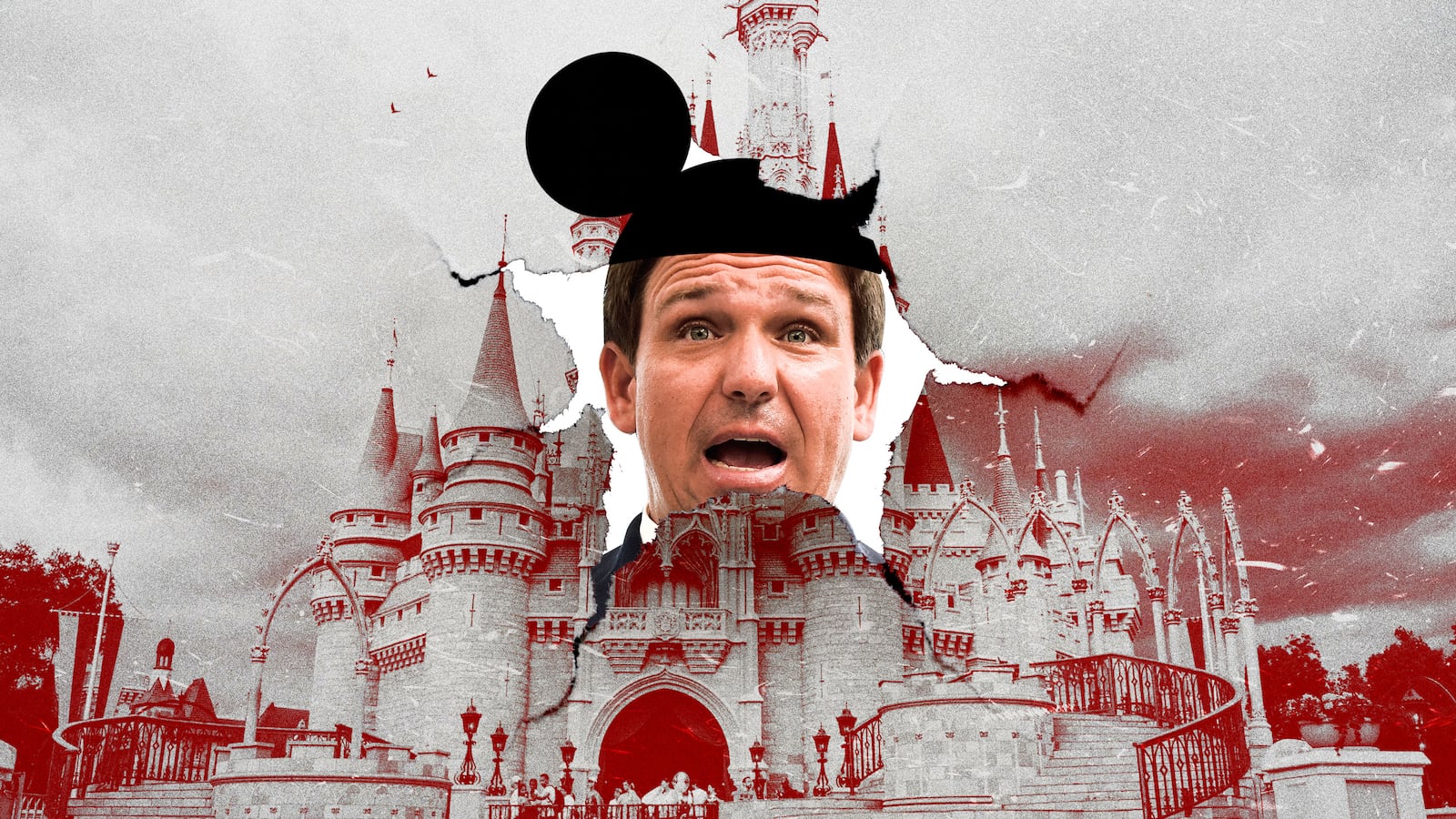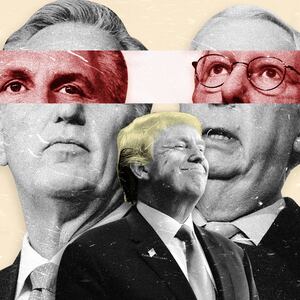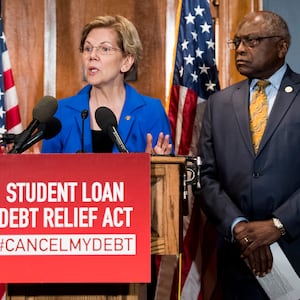Ron DeSantis’ nasty break with Disney over its opposition to Florida’s Parental Rights in Education bill, also known as the “Don’t Say Gay” bill, is the clearest sign yet that the Republican Party has reordered itself as a populist, working-class party—instead of a pro-business party.
For all of my life, the Republican Party was identified as the pro-business party (Republican President Calvin Coolidge didn’t exactly say, “The business of America is business,” but the line stuck, partly because it fit the stereotype). But this image goes back even further than that.
As The Washington Post’s Henry Olsen notes, the GOP’s “19th-century embrace of protective tariffs and subsidies for internal improvements such as railroads helped stoke America’s Industrial Revolution. The rise of the Democratic Party’s allegiance to higher taxes, large spending, regulation and labor unions solidified the GOP as business’s natural ally throughout most of the 20th century.”
In recent years, however, this marriage has been strained. First, free-market conservatives started pointing out that there is a huge difference between being pro-business and pro-free market.
In 2006, for example, a young conservative writer named Tim Carney published a book titled, The Big Ripoff: How Big Business and Big Government Steal Your Money. In it, Carney excoriated crony capitalism, making the point that large corporations benefit from high taxes and regulation, because these barriers to entry stifle future competition (in short, big companies can comply with onerous regulations, while hungry startups cannot).
This worldview gained traction on the right. The Tea Party might have been a populist harbinger of Trumpism to come, but it was also (on paper, at least) a movement of principled constitutional conservatives.
This growing populist sentiment informed criticism of Presidents George W. Bush and Barack Obama’s corporate bailouts. A permission structure emerged, signaling it was no longer an act of conservative apostasy to criticize the rich. In the 2012 Republican primary campaign, this anti-big business ethos allowed Mitt Romney’s conservative rivals to cast him as an out-of-touch plutocrat. Even before Barack Obama went to work on him, Texas Gov. Rick Perry accused Romney of “vulture capitalism.”
Then, the key ingredient came along: The rise of “woke” capitalism.
Since around 2015, corporations have increasingly weighed in on hot-button cultural fights, seeming to always come down on the progressive “social justice” side, while undercutting conservatives.
But why? Alienating the “pro-business” party doesn’t make much sense when the only other game in town is a political party that has decidedly not sought to replace its pro-business role.
Some observers speculate the rise of “woke” capitalism came about because today’s businesses demand young creative workers, and these people tend to lean to the left. Others hypothesize that this is all a play for the much-coveted 18-34 age market. I think the more likely reason is, as The New York Times columnist Ross Douthat, hypothesized, “the activism increasingly exists to protect the self-interest and the stinginess—to justify the ways of CEOs to cultural power brokers, so that those same power brokers will leave them alone (and forgive their support for Trump’s economic agenda) in realms that matter more to the corporate bottom line.”
In other words, virtue signaling for progressive causes is like buying indulgences. Or, to pivot off of Winston Churchill’s characterization of appeasement, giving money and air cover to progressive causes is like feeding “a crocodile—hoping it will eat him last.”
And eat them last, it may, since DeSantis (and today’s new brand of populist Republicans) seem likely to eat them first—as evidenced by DeSantis’ swift move to eliminate tax exemptions for Walt Disney Co.
Again, this didn’t come out of nowhere. Political reorderings don’t happen overnight. And it often takes two to tango. But we have moved from the “just threats” phase of the divorce to DeSantis filing separation papers. In so doing, DeSantis is actually fighting and winning a culture war that Trump only talked about (while simultaneously giving tax cuts to corporations).
Along the way, conservative criticism of business has shifted from philosophical concerns about free markets to cultural concerns.
Now, to some degree, there has always been a tension between business and cultural conservatism. Daniel Bell’s 1976 book, The Cultural Contradictions of Capitalism precisely made this point. Traditional conservative values like hard work make civilizations productive and rich, but (along with a better mousetrap) capitalism “sells” consumerism, hedonism, and self-gratification. So conservatism creates a system and a culture that sows the seeds of its own demise.
Globalism and the rise of a new class of technical elites has only made this problem more acute. You can hear it eloquently put in a much-discussed populist monologue Tucker Carlson delivered back in 2019.
“We are ruled by mercenaries who feel no long-term obligation to the people they rule. They’re day traders. Substitute teachers. They’re just passing through. They have no skin in this game, and it shows,” Carlson said. “The overriding goal for America is more prosperity, meaning cheaper consumer goods,” Carlson lamented. “But is that still true? Does anyone still believe that cheaper iPhones or more Amazon deliveries of plastic garbage from China are going to make us happy? They haven’t so far. A lot of Americans are drowning in stuff. And yet drug addiction and suicide are depopulating large parts of the country. Anyone who thinks the health of a nation can be summed up in GDP is an idiot.”
If Carlson is the intellectual popularizer of today’s populist brand of conservatism, then DeSantis has emerged as its most effective political leader. But what makes his war on Disney a slam-dunk on the right is that, to some degree, it marries the concerns of yesterday’s free-market conservatives (who oppose Disney’s special tax breaks) with the raw political vengeance that animates today’s new right. As Henry Olsen wrote, DeSantis “thus has delivered a political masterstroke, regardless of what one might think about the propriety of his effort.”
For example, I don’t think Disney should have been granted special exemptions in the first place, so removing them seems fine to me. “Disney owns its own utilities. It administers its own planning and zoning. It composes its own building codes and employs its own inspectors. It maintains its own fire department. It even has the authority to levy taxes,” wrote Carl Hiaasen in his 1998 book Team Rodent: How Disney Devours the World.
Likewise, as a patriotic American, I find it utterly hypocritical how Disney (and so many of the worst “woke” capitalism offenders) attack duly elected conservative politicians in America, while turning a blind eye to China’s atrocities.
Of course, the problem is that DeSantis clearly did this out of vengeance. As far as I know, DeSantis didn’t have any problems with crony capitalism toward Mickey Mouse—until that mouse became a rat and tried to stymie his political agenda.
Anyone libertarian enough to complain about big business distorting the free market ought to care even more about a “Gangster Government” where politicians use their political power to punish their political enemies.
But regardless of how you feel about the merits of DeSantis’ play, the fact that he is at the vanguard of this new paradigm shift suggests to me that he is very well aware of the trends I’ve just discussed. Depending on your political ideology, that makes him a lot more exciting—or dangerous—than Trump.
You may not like Ron DeSantis, but he built a better mousetrap.







